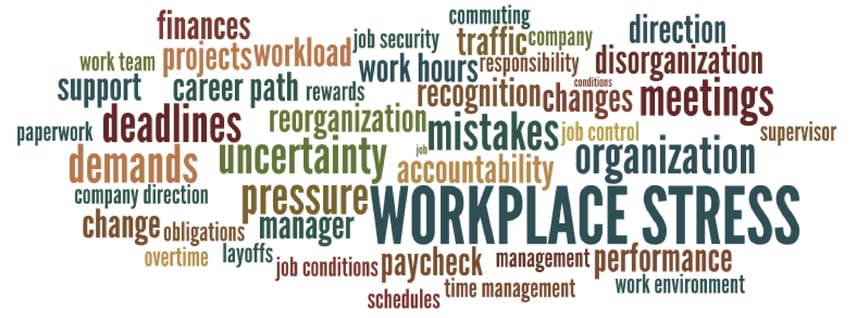
It’s always been said that prevention is better than cure, and as we start a new year, let’s nip any potential stress in the bud with the following eight tips. Because we all know that stress is a contributing factor in workplace incidents, so are any tools to manage the risk always welcome.
What is excessive workplace stress?
Stress isn’t always bad. Stress within your comfort zone can help you stay:
- focused
- energetic, and
- able to meet new challenges in the workplace.
Stress is what keeps you on your toes during a presentation, or alert to prevent accidents or costly mistakes at work. But these days, the workplace can often seem like an emotional roller coaster. There’s long hours, tight deadlines, and ever-increasing demands that can leave you feeling worried, uncertain, and overwhelmed by stress.
When stress exceeds your comfort zone, it stops being helpful and starts causing major damage to your mind and body, as well as your job satisfaction. But no matter what you do for a living, or how stressful your job is, there are plenty of things you can do to reduce your overall stress levels and regain a sense of control at work.
But first, let’s look at how to recognise signs of workplace stress…
Stress-at-work warning signs
When you feel overwhelmed at work, you lose confidence and may become angry, irritable, or withdrawn. Other signs and symptoms of excessive stress at work include:
- feeling anxious, irritable, or depressed
- apathy, loss of interest in work
- problems sleeping
- fatigue
- trouble concentrating
- muscle tension or headaches
- stomach problems
- social withdrawal
- loss of sex drive
- using alcohol or drugs to cope.
8 ways to combat workplace stress
1. Take time for a proper break and look after yourself
Eating well and taking regular exercise is essential for ensuring good levels of psychological wellbeing. Not only does physical activity release endorphins, which improve our mood, it also helps to relieve excess stressful energy.
With the majority of us working longer hours than previously, it can be tempting to skip meals, but eating well and eating regularly is important. More than six million people skip their lunch break each day, which research suggests amounts to an estimated R1 000 million in lost productivity. Simple ways to boost energy levels include cutting down on caffeine and eating low sugar foods that release energy slowly. This will help to sustain energy levels and productivity while keeping stress hormones to a minimum. Also eat small and frequent meals – this will also help your body maintain an even level of blood sugar, keeping your energy and focus up, and helping you avoid mood swings.
Adopt these five healthy habits:
- Minimise sugar and refined carbs.You may crave sugary snacks, baked goods, or comfort foods, such as pasta or French fries, but these ‘feel-good’ foods quickly lead to a crash in your mood and energy.
- Reduce your intake of foods that can adversely affect your mood, such as caffeine, alcohol, trans fats, and foods with high levels of chemical preservatives or hormones.
- Eat more Omega-3 fatty acids to give your mood a boost.The best sources are fatty fish (salmon, herring, mackerel, anchovies, sardines), seaweed, flaxseed, and walnuts.
- Avoid nicotine.Smoking when you're feeling stressed may be calming in the short term, but nicotine is a powerful stimulant, leading to higher, not lower, levels of anxiety.
- Drink alcohol in moderation.Alcohol temporarily reduces worry, but too much can cause anxiety as it wears off.
2. Don't forget the power of conversation
Having face-to-face conversations can often solve issues quicker and establish a more personal rapport with colleagues. In particularly stressful situations, containing our emotions can actually damage our health, so take time to have proper discussions with those around you and you’ll make a real difference to your wellbeing and performance at work.
3. Build strong social networks
Building relationships with colleagues will provide a reliable support network for episodes of stress and anxiety when the pressure is most intense. Working with those you trust and can rely on also boosts job satisfaction and motivation levels. These are key components of workplace resilience and will help to combat the rise of stress and anxiety, making it much easier to reach out for help if the pressure becomes too much. Arrange meals and lunchtime social activities together as an easy and direct way to bond more with those around you.

4. Make sure you unwind and take time out
Mobile technology means we're finding it harder to switch off at the end of the working day and balance our priorities. The temptation to check emails late at night or at weekends means that we're more likely to worry as we find it difficult to distance ourselves from a working mind set. Set a cap on your working hours, switch off your emails and set aside time to relax. Take regular breaks to clear your head during the day too; going for a quick walk in the afternoon can help relieve nervous tension and help you to make more balanced decisions. Many organisations now offer employee assistance programmes (EAPs), which give advice and guidance on how to ensure a healthy work–life balance.
5. Know your limits
Show that you're able to manage competing pressures and priorities; it’s an attractive attribute for prospective employers. But remember, saying yes to every request and taking on more work than you can reasonably handle is detrimental both to your own wellbeing and performance. Remain assertive and you’ll reduce the chance of over-burdening workloads and the pressure to meet unrealistic expectations. Retaining a strong sense of your own abilities will make sure that you perform to your best and help to prevent exhaustion and burnout in the long run.
6. Get enough sleep
Not only can stress and worry can cause insomnia, but a lack of sleep can leave you vulnerable to even more stress. When you're well rested, it's much easier to keep your emotional balance, a key factor in coping with job and workplace stress.
- Try improve the quality of your sleep by keeping a regular sleep schedule and aiming for eight hours a night.
- Avoid stimulating activity and stressful situations before bedtime.
- As we mentioned in point 4, turn off all screens one hour before bedtime. The light emitted from TV, tablets, smartphones, and computers suppresses your body’s production of melatonin and can severely disrupt your sleep. Instead, focus on quiet, soothing activities, such as reading or listening to soft music, while keeping lights low.
Stress, sleep and shift work
Working night, early morning, or rotating shifts can impact your quality of sleep, which in turn can affect productivity and performance, and leave you more vulnerable to stress.
- Adjust your sleep–wake cycle by exposing yourself to bright light when you wake up at night, using bright lamps or daylight-simulation bulbs in your workplace, and then wear dark glasses on your journey home to block out sunlight and encourage sleepiness.
- Limit the number of night or irregular shifts you work in a row to prevent sleep deprivation mounting.
- Avoid frequently rotating shifts so you can maintain the same sleep schedule.
- Eliminate noise and light from your bedroom during the day. Use blackout curtains or a sleep mask, turn off the phone, and use ear plugs or a soothing sound machine to block out daytime noise.
7. Prioritise and organise
When job and workplace stress threatens to overwhelm you, use these simple, practical steps to regain control over the situation.
- Create a balanced schedule.All work and no play is a recipe for burnout. Try to find a balance between work and family life, social activities and solitary pursuits, daily responsibilities and downtime.
- Leave earlier in the morning.Even 10–15 minutes can make the difference between frantically rushing and having time to ease into your day. Don’t add to your stress levels by running late.
- Plan regular breaks.Make sure to take short breaks throughout the day to take a walk or chat to a friendly face. Also try to get away from your desk or work station for lunch. It will help you relax and recharge and be more, not less, productive.
8. Break bad habits
Many of us make job stress even worse with negative thoughts and behaviour. If you can turn these self-defeating habits around, you’ll find employer-imposed stress easier to handle. So, try the following:
- Resist perfectionism.When you set unrealistic goals for yourself, you’re setting yourself up to fall short. Aim to do your best; no one can ask for more than that.
- Flip your negative thinking.Try to think positively about your work, avoid negative-thinking co-workers, and pat yourself on the back about small accomplishments, even when no one else does.
- Don’t try to control the uncontrollable.Many things at work are beyond our control, particularly other people’s behaviour. Rather than stressing out over them, focus on the things you can control, such as your reaction to problems.
- Look for humour in the situation.When used appropriately, humour is a great way to relieve stress in the workplace. When you or those around you start taking things too seriously, find a way to lighten the mood by sharing a joke or a funny story.
Managers and employers can also make a difference in reducing stress at work
If you’re a manager, you too can act as a positive role model. If you can remain calm in stressful situations, it’s much easier for your employees to follow suit. You can also make a number of organisational changes to reduce workplace stress, including:
- improving communication
- consulting your employees
- cultivating a friendly, social work environment.
Related post: Is your workplace up to scratch?
Sources:
https://www.theguardian.com/careers/careers-blog/five-top-tips-to-beat-work-stress
http://www.helpguide.org/articles/stress/stress-at-work.htm
https://www.virgin.com/disruptors/five-ways-to-beat-workplace-stress





